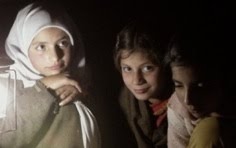 Working with Story has endless possibilities. Personal Narrative - stories from our own everyday lives - is one aspect of Storywork.
Working with Story has endless possibilities. Personal Narrative - stories from our own everyday lives - is one aspect of Storywork.Often we imagine that to be a storyteller, we need to find stories only in books or other traditional sources. But stories from our own lives, telling of joys, sorrows, challenges, achievements, successes and recoveries can do so much for us as well. It has been said that personal histories provide a “golden thread of awareness” in us, helping us know, remember, reflect, question, and understand ourselves and the world around us.
Personal storytelling builds groups and communities.
We often get judgmental when we do not know people well; when we know someone's story, we can't help but understand them more, if not actively like them. It doesn't matter if we are different culturally, financially or generationally - our stories enrich each others’ lives.
Personal storytelling creates networks of support and encouragement.
People who have gone through the same illnesses or problems, find relief and release through the sharing of their stories. They realize they are not alone; perhaps even that others have bigger problems, and also that there could be hope through all this suffering. It can also teach us to count our blessings, to empathize and to reach out.
Personal Storytelling provides us with options and solutions.
Sometimes, listening to steps others have taken can show us alternative ways of behaving, or gives us options to choose from, and often gives us courage too.
Personal stories help us replace negative interpretations with positive ones.
Some stories about ourselves that we continue to carry have been feeding us with damaging or unhelpful information. These stories need to be first told, then left behind, to be replaced with future positive stories. Messages in these stories that say "you can't" can be replaced with those that affirm "I can". This makes it much easier to live out of the new telling.
Personal storytelling can help younger people to go through life’s passages.
My friend Carolyn created a special book for young Lina , then 12, that wasn’t only filled with information; she had a group of us women all write our own first menstruation stories that included the fears, the anticipation. Lina, now 30, still treasures this very personal gift and says she will share it with her two young daughters.
Personal storytelling can bond us intergenerationally.
Alright, we have all known – or have been - adults who have told stories about our childhood and had the listeners roll back their eyes way into their sockets in disbelief (the more polite ones, anyway!). But how about a story ‘exchange’? Children and adults can come together and tell and listen to each others’ stories. And it needn’t always be about how good or studious or kind or generous we used to be…
Personal storytelling helps us know each other better.
I am not just talking of those who have just met – old friends and long-time couples too often can discover stories and events they have not talked of before – funny, sad, embarrassing, learningful – profound or just plain silly. Recently, a women’s group I am part of, and who have known each other for many years, shared ‘new’ pieces of our lives that have made us realize that we are all so multifaceted, and there is no end to getting to know each other more deeply – it just takes time and loving awareness.
Personal storytelling can help create a precious, enduring gift.
A woman I know collected family recipes from her mother, grandmothers, aunts and grandaunts, adding a personal anecdote/story and a photograph from each of their lives, and had a book printed for each of the twenty-six young women in her extended family.
Personal storytelling is healing and releasing.
There are times when having told and released our story, we are free to let go and move on. Isak Dinesen wrote, “All sorrows can be borne if you put them into a story or tell a story about them.” This does not necessarily involve speaking it out to another person. Individuals have often written their own stories as a myth or fairy tale, or created paintings and sculptures that allow them to now step forward with their lives.
May you find ways to share your personal stories.
Marguerite Theophil
Practicing and protecting stories
The telling of our stories is as basic, important and necessary
as our personal freedoms, yet, sadly, also as threatened.
When not practiced and protected, stories are lost to obscurity
and knowledge itself is placed in jeopardy.
When not practiced and protected, stories are lost to obscurity
and knowledge itself is placed in jeopardy.
~ Waddie Mitchell
